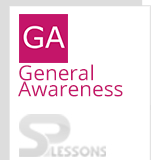 Introduction
Introduction
General Awareness is an important component of most of the competitive exams for employment in the government sector in India. The article RRB NTPC General Awareness Quiz 4 presents questions related to IBPS PO, SSC CGL, SSC MTS, SSC CHSL, SEBI Grade A, Indian Bank PGDBF PO, LIC HFL, NIACL Assistant, RRB Assistant, RRB PO, SBI Clerk, SBI PO, RBI Grade B and BOB PGDBF PO. The article RRB NTPC General Awareness Quiz 4 have been designed keeping in view the significant role of General Awareness sections in the scoring of competitive exams. RRB NTPC General Awareness Quiz 4 is very useful to crack the General Awareness sections of several competitive exams.
 Pattern
Pattern
RRB NTPC General Awareness Quiz 4 - Exam Pattern
The RRB NTPC General Awareness section in the First Stage CBT, has the 40 objective questions. Below mentioned are the different categories of expected questions in the First Stage CBT of RRB NTPC General Awareness Section.
| Exam Duration in Minutes | No. of Questions (each of 1 mark) from | Total No. of Questions | ||
|---|---|---|---|---|
| General Awareness | Mathematics | General Intelligence and Reasoning | ||
| 90 | 40 | 30 | 30 | 100 |
 Syllabus
Syllabus
[Click Here] for RRB NTPC First Stage CBT Syllabus
Note:
Negative Marking: There will be negative marking and 1/3 mark shall be deducted for each wrong answer.
 Quiz
Quiz
1. At the time of enactment of the Constitution which on of the following ideas was not included in the preamble ?
-
A. Justice
B. Socialist
C. Liberty
D. Equality
-
A. The parliament
B. The Speaker of Lok Sabha
C. The Comptroller and Auditor General
D. The president
-
A. Right to Constitutional Remedies
B. Right against Exploitation
C. Right of Equality
D. Right of Religion
-
A. Right against exploitation
B. Equality before law
C. Right to freedom to religion
D. Equal pay for equal work
-
A. parliamentary system
B. presidential system
C. Quasi - presidential system
D. plural executive system
1. The party system is the part of which larger system among the following ?
-
A. Social system
B. Economic system
C. political system
D. International system
-
A. IV B
B. V
C. IV
D. IV A
-
A. 12 months
B. 1 month
C. 3 months
D. 6 months
-
A. 1950
B. 1952
C. 1951
D. 1953
-
A. 6 months
B. 4 months
C. 6 months, 10 days
D. 90 days
1. Who represents the State Government at Panchayat level?
-
A. Gram Sevak
B. Mukhiya
C. Sarpanch
D. Panchayat Samiti
-
A. Speaker of the Lok Sabha
B. Parliament
C. Supreme Court
D. Parliament
-
A. Indira Gandhi
B. Benazir Bhutto
C. Margaret Thatcher
D. Sirimavo Bandaranaike
-
A. All members are for the life time.
B. It cannot be dissolved.
C. It is in session for entire year.
D. None of these
-
A. Only a socialist State.
B. State having Presidential Administrative System
C. State having Parliamentary Administrative System
D. State whether Head of the State is not hereditary.



